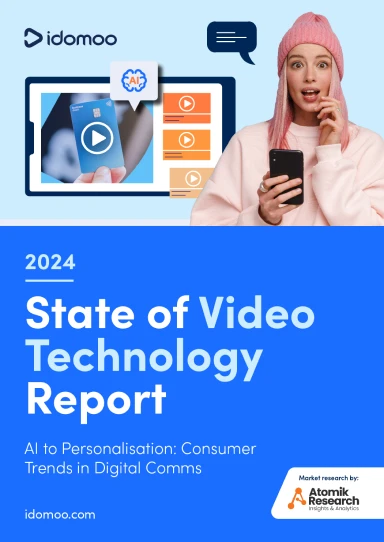This year, we again conducted a market study of 2,000 consumers, asking them their opinions on a range of customer communications, especially video. It’s an annual report (you can get the latest data here), but this year, we looked at something new — how interested are they in receiving AI video from brands?
We also asked if they would want to know if the video was created using AI. Then we dug into the data, evaluating it by different demographic splits to look for patterns. One instant standout was the different responses by generation. Over 75% of millennials and Gen Z are interested in receiving AI video from brands. This decreases with older generations, dropping to 63% for Gen X, 42% for boomers and 27% for the Silent Generation.
But what we’ve found with previous market studies is that what younger generations, especially Gen Z, want today is what the general population will want tomorrow. In other words, when it comes to video tech — at least in the context of brand communications — they’re early adopters.
MarketingSherpa, a research institute and publication focused on customer-first marketing, wrote an article about this. In their words, “AI-created videos have clear value to marketers and entrepreneurs. For one, you can create videos less expensively.”
Speed is a big issue when it comes to video creation since time and bandwidth are the biggest hurdles keeping 61% of companies back from creating video content.
But it doesn’t have to be that way. See the video below that we created from our market study webpage. Our AI handled the script, storyboard and all other assets to generate this video in under 5 minutes.
Of course, as the MarketingSherpa article goes on to explain, it’s up to marketers to leverage this technology in a thoughtful way that genuinely improves the customer experience.
To dig in a little more, here’s the full interview with questions from Daniel Burstein, MarketingSherpa’s Senior Director of Content & Marketing, and answers provided by our CMO, Yotam Ben Ami, as well as Chandler Worley, Director of Insights & Analytics at Atomik Research, the independent market research firm that fielded the study.
AI Video Takeaways for Brands
Based on the data showing significant interest in AI video content among younger generations, what do you believe are the broader implications for brands in terms of content strategy and customer engagement?
Ben Ami: Younger demographics often find new technologies more appealing, many times to the degree of seeking them out. Brands that wish to connect with those audiences should keep this in mind. I expect brands to adopt AI video as an integral part of their content strategy much more rapidly than with other media, like legacy video for example. The reason for this is that not only are their most desired audiences craving it, but the technology itself makes it easy to generate quality, usable content at scale. AI video drives content velocity.
Burstein: How should brands rethink their video content strategies to cater to the strong interest in AI-generated content among Gen Z and millennials?
Ben Ami: Those brands that use video to engage their younger audiences (a surprisingly high percentage of them still don’t, as evidenced by the video gap we consistently see in our study) generally do so in a very thought-out and planned way. Video content takes considerable time and money to produce, so a lot of thought and iteration goes into the scripting, storyboarding, producing, editing and distribution of the content. This holds even more true for personalized video content.
However, AI video enables the creation of vast amounts of content at a fraction of the cost of traditional video. This will allow brands to adopt a more agile approach to video production, based more on testing many content variants and replicating the winners than on trying to predict which content will work ahead of time.
In addition, the ease with which usable video content can be created using AI will cause companies to empower employees that have traditionally not been able to create video content with the ability to do so. Whether it’s a sales rep following up after a meeting or a recruiter onboarding a new employee, they will now be able to do so leveraging the power of video.
How does this study’s findings compare to previous research on consumer engagement with video content? Are there any noticeable shifts in consumer behavior or preferences?
Worley: Yes, there is a noticeable increase in demand for customizable and interactive video as well as a slight uptick in consumers’ demand for branded video content in general, but the gap between consumers who currently receive branded video content and those who would like to receive branded video content remains. We anticipate this gap to continue to grow unless brands eventually begin to embrace video communications.
How did the interest levels in AI-generated content and tools for content creation vary across different demographics besides Gen Z and millennials?
Worley: In addition to Gen Z and millennial consumers, data suggests that having access to an AI-video creation tool would make Gen X consumers more likely to create more video content. More specifically, 73% of Gen X said they were more likely to start creating video content or increase output of their video content if they had access to an AI-video content creation tool. In comparison, only 49% of baby boomers and the silent generation — or consumers 60 and older — say having access to such a tool would make them more likely to create video content.
In the context of AI-driven video content, how should brands measure success and ROI? Are there new metrics or KPIs that companies should consider?
Ben Ami: I don’t think the metrics are new, but I do think the results when calculating those metrics will be dramatically better. One of the challenges with video is that it costs a lot to produce and then has a limited shelf life, resulting in a problematic ROI and somewhat limited uses. AI video will drastically reduce the costs to produce video content, thereby making the ROI for most video applications skyrocket and lowering the bar for adopting video as a means to achieve a given business goal.
Based on the study’s findings, what recommendations would you give to brands looking to leverage AI in their video marketing strategies to engage younger audiences?
Worley: Based on findings, younger consumers appear more demanding when it comes to quality and personalization of branded communications content. Therefore, if brands want to engage with younger consumers, they will need to take steps to reassure younger consumers that the AI-generated content they receive contains accurate and clearly personalized information.

Transparency With AI Content
How do you interpret the high percentage of Gen Z and millennials who want to know if a video is AI-generated? What does this mean for transparency and trust in brand communications?
Ben Ami: Trust and transparency are important for brands and even more so when it comes to younger demographics. However, I don’t think that brands should feel a need to share that video content was created using AI, even if we do see a curiosity amongst these audiences in knowing that. There is no pretense that it was not created using AI, and therefore there is no trust broken.
Having said that, some brands may find that they want to share that the content was created using AI, as our study shows this can reflect positively on brand perception, to the point that consumers are 2x more likely to purchase from a brand they perceive as innovative.
How should brands approach transparency in their use of AI for content creation?
Worley: Perhaps brands should provide consumers with the reasons why they leverage AI tools to create content. If brands were to be more transparent about the benefits of AI videos, such as having the ability to create more personalized content that is relevant to individual consumers or to ensure that consumers aren’t receiving irrelevant communication, then consumers would feel more comfortable receiving AI-generated content.
Looking to the Future With AI
How do you see the role of AI in video content evolving in the near future based on the trends identified in this study?
Worley: I believe early adopters of AI-generated video content will have a significant advantage over brands that do not leverage AI with their video content. As demand for personalized content increases, it will be harder for brands to deliver this type of content without the help of AI. Those who don’t leverage AI are likely to be left behind.
What are the potential challenges or considerations brands should be aware of when integrating AI into their video content strategies, according to your research?
Worley: Brands will need to make sure that the AI tools or platforms they use to generate video content are of the highest quality. Also, they would need to find innovative ways to ensure AI-generated content looks and feels authentic. For instance, AI content with a robotic sounding narrator may be a significant turn-off for many consumers.
Are there any ethical considerations or best practices that emerged from this study regarding the use of AI in creating brand videos?
Worley: There are many consumers who have little trust in companies and businesses keeping their data secure. However, [our research found that] a majority are willing to share their personal data if it means they get a more personalized experience with a brand they already have a relationship with. If businesses and brands collect intimate or personal details from customers to create more personalized content, then they owe it to their customers to maintain the highest level of data privacy and cybersecurity in order to reduce the chances of a breach in customers’ sensitive personal data.
What advice would you give to marketers looking to integrate AI into their video content strategies effectively?
Ben Ami: Don’t wait. The technology is already here, and the efficiencies it delivers can be mind-blowing. We see clients who spend millions of dollars and hundreds of work hours on producing relatively straightforward video ads. Ai video can do that work in minutes and at a fraction of the cost. And while it may sound daunting, it is actually very easy to jump right in and start producing AI video content for any use, with a simple prompt, whether that’s a line of text or a webpage or a PDF or PPT document.





